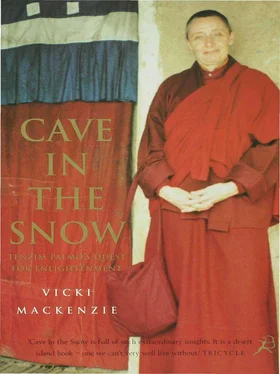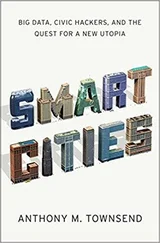‘But people couldn’t see it, they were so indifferent. I could never understand why. Didn’t they understand this is a terrible situation we’re all trapped in? I felt it really, really in the depths of my being,’ she said with great feeling. ‘However, since nobody understood what I was talking about, and just thought I was being incredibly gloomy, I stopped discussing it.’
Interestingly, what the young girl was worrying about in the East End of London was exactly the same issue that had troubled the young Prince Siddhartha in India back in 560 BC when he had left his sheltered palace and been confronted with a diseased man, an ageing man and a corpse. These ungainly sights had had such a shocking impact on his sensibilities that he had abandoned his easy, privileged existence and gone searching for the reasons that lay behind the human condition with all its attendant suffering. After many years of wandering, testing and trying the various spiritual methods on offer, he finally found his answer under the boddhi tree in Bodhgaya where, in profound meditation, he broke through the barriers of ignorance and attained Enlightenment. In doing so he became the Buddha, the Fully Awakened One, and triggered off a religion which was to inspire millions down the ages who tried to emulate him. But they were mostly in the East.
There was, however, another larger question which was preoccupying Tenzin Palmo, one which was to form the raison d’etre of the entire course of this present life. It was the very touchstone of Buddhism. ‘I wanted to know, how do we become perfect? Ever since I was small I had this conviction that we were in fact innately perfect and that we had to keep coming back again and again to rediscover our true nature. I felt that somehow our perfection had become obscured and that we had to uncover it, to find out who we really were. And that was what we were here for. I asked my mother if she believed in reincarnation and she replied that it seemed very logical to her and she didn’t see why not, so that part of the question seemed OK.’
Getting the answer to the rest of it was more of a problem. She asked the spirit guides.
‘First of all, I asked, “Is there a God?" And they said, “We definitely don’t think there is a God in the sense of a person, but ultimately we feel there is light, and love and intelligence." That sounded good to me. So then I asked them the number one question in my life, “How do we become perfect?" And they replied, “You have to be very good and very kind." And I thought, "They don’t know." At that point I completely lost interest in spiritualism as a path,’ she said.
She next turned to the local priest, Father Hetherington, whom she liked on account of the fact that he was tall, ascetic and monk-like. She would go to her local Anglican church occasionally with Lee, appreciating its pseudo-Gothic architecture.
‘He replied, “Well, you have to become good." And, “You have to become good and you have to be kind." And I thought, “That’s not it!" Of course you’ve got to be good and kind, that’s the foundation. But Perfection! That’s something else. I knew a lot of people who were good and kind, but they certainly weren’t perfect. It was something more. What was the more , that was what I wanted to know,’ she said, her voice taking on the urgency she had felt when she was a child.
Christianity, her home-grown religion, had never had any resonance for Tenzin Palmo. In fact it posed more dilemmas than solutions. Her fundamental problem was that she could not believe in the idea of God as a personal being. ‘To me, he seemed like Father Christmas,’ she said. ‘I can also remember being particularly puzzled by the hymns. I used to sing at school “All things bright and beautiful, all things great and small, all things wise and wonderful, the Lord God made them all", and at the same time I would be wondering, “Well, who made all things dull and ugly then?" It was the same with the harvest hymns, praising God for the sunshine and rain. In that case, I thought God must also have brought the drought and the famine.’ Tenzin Palmo, it seemed, was confronting the problem of ’duality’, good and evil, dark and light, big and small, looking for an answer that transcended the opposites.
She kept looking, looking for something. She wasn’t sure what. When she was thirteen she tried reading the Koran, she attempted yet again to understand Christianity. It remained an enigma. At fifteen she took up yoga and through that was introduced to Hinduism. That satisfied her somewhat, but only to a point. Once again her stumbling block was God.
’The problem was that all these religions were based on the idea of this external being who it was our duty somehow to propitiate and come into contact with. That simply didn’t have any inner reference for me. If it is meaningful for you it absolutely works, but if it isn’t you’re left with nothing. You need to believe in this transcendent being in the first place and have a relationship with it in order to make any progress. If you don’t, like me, there is nothing to get going on,’ she explained. ’I remember entering into a discussion with my future sister-in-law who was a good friend of the family. She was Jewish and was arguing that Jesus was not the son of God. Carrying on her argument I got to the point that there was no God. To me it was like this tremendous revelation. ‘Yeah! That’s exactly how I feel.’
When she was a teenager she turned to the Existentialists, reading Sartre, Kierkegaard and Camus ‘in a very superficial way’. The trouble here, she found, was that although they were asking all the right questions, and stating the problem about the human condition, they were not coming up with the answers.
She kept searching.
At school a teacher read them Heinrich Harrer’s book Seven Years in Tibet , about his journey to the Land of Snows and his friendship with the Dalai Lama. And Tenzin Palmo marvelled that such a being existed in this world. And when she was around nine or ten years old she saw a programme on the temples in Thailand. On one temple there was a frieze depicting the life of the Buddha. She turned to Lee and asked her who he was. ‘He’s some kind of oriental god,’ her mother replied. ‘No, he lived and has a story, like Jesus,’ Tenzin Palmo replied, with conviction. It was only a matter of time before she found out exactly what that story was.
Chapter Three
The Dawning – Finding the Path
The breakthrough happened one day when Tenzin Palmo and her mother were about to go to Germany to spend Christmas with Mervyn, Tenzin Palmo’s brother who had joined the RAF and was stationed there. It was 1961, and Tenzin Palmo was eighteen. She had left her grammar school a year earlier and had started work at the Hackney Library, a nice, quiet job just as her teachers had recommended. It suited her methodical, meticulous mind and great love of books admirably. She had hoped to go to university to study English and philosophy but Lee could not afford it and Tenzin Palmo had consoled herself with the thought that earning money would get her out of England quicker. ‘The homesickness for the East was agonizing at times,’ she said. Needing something to read for her German holiday, she took three books from the library: a Sartre, a Camus and one other which she grabbed at the last moment because someone had just brought it in. It had a nice image of the Buddha on the cover but it was the title, The Mind Unshaken , that caught her eye. In Germany she read the Sartre and the Camus but for some reason had ignored the Buddhist book. In the airport on the way home, however, there was an eight-hour delay and as it was a military establishment with no shops or amusements on offer she had no alternative to relieve her boredom but to open its pages. She had got half-way through it when she turned to her mother and said in a small, surprised voice: ‘I’m a Buddhist.’ Lee Perry replied in her down-to-earth way: ’That’s nice, dear, finish reading the book and then you can tell me all about it.’ Tenzin Palmo was not so phlegmatic. ‘To me, it was astonishing. Everything I had ever believed in, there it was! Much better stated than anything I could have formulated for myself, of course, but nonetheless! That view! It was exactly as I thought and felt. And together with that was this absolutely clear and logical path to get us back to our innate perfection.’
Читать дальше












